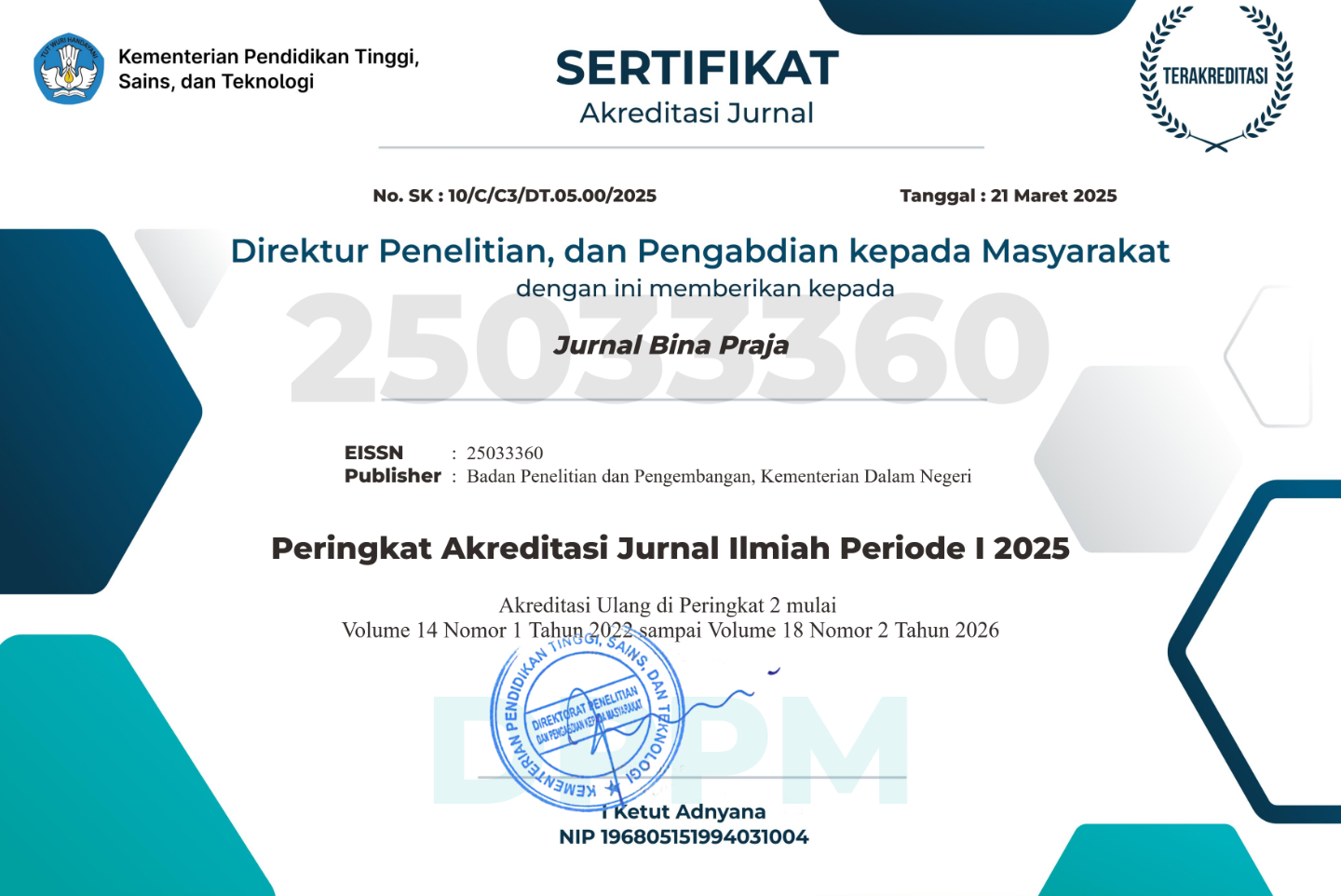Indonesia After Joko Widodo
The Increase in Politics and Public Administration
DOI:
https://doi.org/10.21787/jbp.09.2017.255-264Keywords:
Politics, Economy, Joko WidodoAbstract
This study aims to capture public appraisal, especially student groups as young voters. The public appraisal that will be captured relates to the satisfaction of young voters on the performance of one year of government Jokowi Jusuf Kalla. Using the survey method, this study will be conducted on student groups in the Pancasila and Citizenship Education Study Program, Ahmad Dahlan University. Data collection was done by spreading the questionnaire which then performed tabulation and correlation analysis. This study is expected to be the baseline data in the first year of Jokowi Jusuf Kalla's reign as the basis for future leadership prediction analysis for the next four years. Thus, by knowing the basic pattern in the first year it will be analyzed how would the trend of satisfaction and political beliefs of society until the end of office Joko Widodo.
Downloads
References
Blais, J., & Pruysers, S. (2017). The power of the dark side: personality, the dark triad, and political ambition. Personality and Individual Differences, 113, 167–172. http://doi.org/10.1016/j.paid.2017.03.029
Bynander, F., & ’t Hart, P. (2006). When Power Changes Hands: The Political Psychology of Leadership Succession in Democracies. Political Psychology, 27(5), 707–730. http://doi.org/10.1111/j.1467-9221.2006.00529.x
Chi, E., & Kwon, H. Y. (2012). Unequal New Democracies in East Asia: Rising Inequality and Government Responses in South Korea and Taiwan. Asian Survey, 52(5), 900–923. http://doi.org/10.1525/as.2012.52.5.900
Cohn, T. H. (2012). Global Political Economy (6th ed.). Pearson Longman.
Cole, R. L. (1973). Toward as Model of Political Trust: A Causal Analysis. American Journal of Political Science, 17(4), 809. http://doi.org/10.2307/2110610
Dawkins, R. (2017). Political participation, personality, and the conditional effect of campaign mobilization. Electoral Studies, 45, 100–109. http://doi.org/10.1016/j.electstud.2016.11.018
Ebrahim, M. S., Girma, S., Shah, M. E., & Williams, J. (2014). Dynamic capital structure and political patronage: The case of Malaysia. International Review of Financial Analysis, 31, 117–128. http://doi.org/10.1016/j.irfa.2013.11.004
Galasso, V., & Nannicini, T. (2015). So closed: Political selection in proportional systems. European Journal of Political Economy, 40, 260–273. http://doi.org/10.1016/j.ejpoleco.2015.04.008
Gilpin, R. (1987). The Political Economy of International Relations. Princeton: Princeton University Press. Retrieved from http://www.jstor.org/stable/j.ctt19wcct3
Goldman, S. (1966). Voting Behavior on the United States Courts of Appeals, 1961–1964. American Political Science Review, 60(2), 374–383. http://doi.org/10.2307/1953364
Gupta, D. K., Madhavan, M. ., & Blee, A. (1998). Democracy, economic growth and political instability: An integrated perspective. The Journal of Socio-Economics, 27(5), 587–611. http://doi.org/10.1016/S1053-5357(99)80113-9
Hetherington, M. J., & Rudolph, T. J. (2008). Priming, Performance, and the Dynamics of Political Trust. The Journal of Politics, 70(2), 498–512. http://doi.org/10.1017/S0022381608080468
Huddy, L., Mason, L., & Aarøe, L. (2015). Expressive Partisanship: Campaign Involvement, Political Emotion, and Partisan Identity. American Political Science Review, 109(1), 1–17. http://doi.org/10.1017/S0003055414000604
Jansen, G., De Graaf, N. D., & Need, A. (2011). Class voting, social changes and political changes in the Netherlands 1971–2006. Electoral Studies, 30(3), 510–524. http://doi.org/10.1016/j.electstud.2011.02.005
Jurjevich, J. R., & Plane, D. A. (2012). Voters on the move: The political effectiveness of migration and its effects on state partisan composition. Political Geography, 31(7), 429–443. http://doi.org/10.1016/j.polgeo.2012.08.003
Kirchner, M., & Wijnbergen, S. van. (2016). Fiscal deficits, financial fragility, and the effectiveness of government policies. Journal of Monetary Economics, 80, 51–68. http://doi.org/10.1016/j.jmoneco.2016.04.007
Klingeman, H.-D. (2015). Market Economy or Social Welfare Policy? The Programmatic Responses of Political Parties to the Global Recession. Taiwan Journal of Democracy, 11(1), 79–109.
Mcallister, I. (2007). The Personalization of Politics. The Oxford Handbook of Political Behavior (Vol. 61). Oxford University Press. http://doi.org/10.1093/oxfordhb/9780199270125.003.0030
Milburn, M. A., & McGrail, A. B. (1992). The Dramatic Presentation of News and Its Effects on Cognitive Complexity. Political Psychology, 13(4), 613. http://doi.org/10.2307/3791493
Palea, V. (2015). The political economy of fair value reporting and the governance of the standards-setting process: Critical issues and pitfalls from a continental European union perspective. Critical Perspectives on Accounting, 29, 1–15. http://doi.org/10.1016/j.cpa.2014.10.004
Rudolph, T. J., & Evans, J. (2005). Political Trust, Ideology, and Public Support for Government Spending. American Journal of Political Science, 49(3), 660. http://doi.org/10.2307/3647738
Scruggs, L. A. (1998). Political and economic inequality and the environment. Ecological Economics, 26(3), 259–275. http://doi.org/10.1016/S0921-8009(97)00118-3
Shahzad, S. J. H., Raza, N., Balcilar, M., Ali, S., & Shahbaz, M. (2017). Can economic policy uncertainty and investors sentiment predict commodities returns and volatility? Resources Policy, 53(October 2016), 208–218. http://doi.org/10.1016/j.resourpol.2017.06.010
Staniland, M. (1985). Fad, Theory, or Problem? In What is Political Economy? A Study of Social Theory and Underdevelopment. (pp. 1–9). New Haven: Yale University Press.
Tao, R., Su, F., Sun, X., & Lu, X. (2011). Political trust as rational belief: Evidence from Chinese village elections. Journal of Comparative Economics, 39(1), 108–121. http://doi.org/10.1016/j.jce.2010.09.004
Tausanovitch, C., & Warshaw, C. (2014). Representation in Municipal Government. American Political Science Review, 108(3), 605–641. http://doi.org/10.1017/S0003055414000318
Tilzey, M. (2017). Reintegrating economy, society, and environment for cooperative futures: Polanyi, Marx, and food sovereignty. Journal of Rural Studies, 53, 317–334. http://doi.org/10.1016/j.jrurstud.2016.12.004
Treadway, D. C., Hochwarter, W. A., Kacmar, C. J., & Ferris, G. R. (2005). Political will, political skill, and political behavior. Journal of Organizational Behavior, 26(3), 229–245. http://doi.org/10.1002/job.310
Wang, C. (2016). Political trust, civic duty and voter turnout: The Mediation argument. The Social Science Journal, 53(3), 291–300. http://doi.org/10.1016/j.soscij.2016.04.008
Weakliem, D. L. (2005). Public Opinion, Political Attitudes, and Ideology. In T. Janoski, R. R. Alford, A. M. Hicks, & M. A. Schwartz (Eds.), The Handbook of Political Sociology: States, Civil Societies, and Globalization (pp. 227–246). New York: Cambridge University Press.
Wisniewski, T. P., & Lambe, B. J. (2015). Does economic policy uncertainty drive CDS spreads? International Review of Financial Analysis, 42, 447–458. http://doi.org/10.1016/j.irfa.2015.09.009
Yamamura, E., & Sabatini, F. (2015). The impact of the media on voters’ attitude toward Junichiro Koizumi and his policy. Japan and the World Economy, 34–35, 24–32. http://doi.org/10.1016/j.japwor.2015.03.003
Ziegler, A. (2017). Political orientation, environmental values, and climate change beliefs and attitudes: An empirical cross country analysis. Energy Economics, 63, 144–153. http://doi.org/10.1016/j.eneco.2017.01.022
















